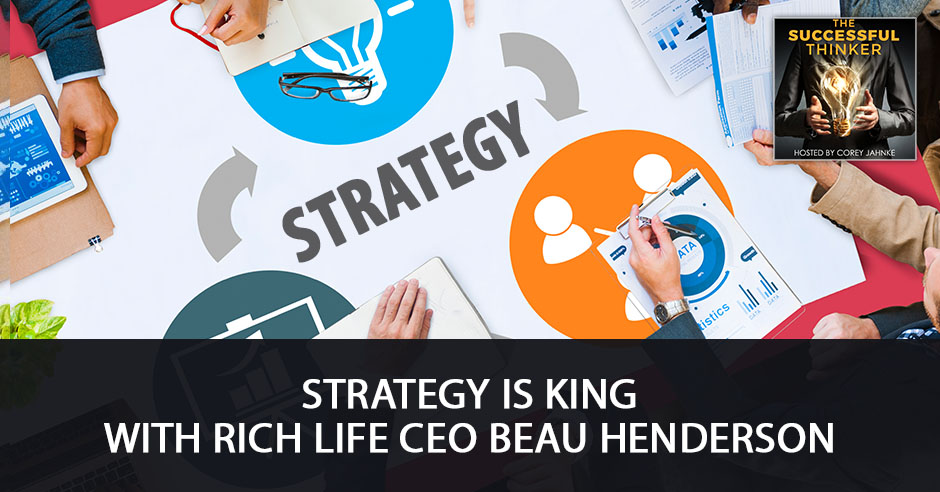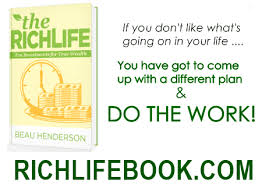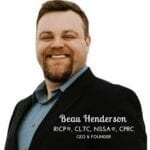
Successful thinkers refuse to act like an ostrich with their heads in the sand. They surround themselves with strategic thinkers and consultants who can help them design a solid financial life and create a success plan that gives them options and fulfillment. Rich Life CEO Beau Henderson shares real-world experiences and gives us a solid look at how retirement can be transformed from something we fear to something we embrace. This is an important episode for anyone who wants to elevate their lives and live a rich and engaging existence.
—
Listen to the podcast here:
Strategy Is King with Rich Life CEO Beau Henderson
It’s Never Too Late To Design YOUR Rich Life
I get to talk to one of my favorite people in the whole world and I get to share him with you. This gentleman and I have been friends for many years. Beau is a wonderful retirement consultant. He’s a money and business coach, a bestselling author, a radio host and the CEO of RichLife Advisors. This man is named Beau Henderson. He lives in the South. He’s got a heart-warming voice and an even more heartwarming personality to go with it. Beau Henderson, how are you?
I’m doing good. I’m excited for us to have this chat together.
One of the things that I love to talk about is how successful thinkers take a whole life approach to everything that they do. Can you tell me how you got started in the financial planning, insurance and retirement consulting industry?
My formal education was in psychology and I was going to go on to graduate school to be a psychologist. The summer before I went to graduate school, my father passed away. I went home at that time to help my mom with his small business and a couple of pieces of real estate. I had to immerse myself in those things, how you navigate taxes and how you work with those things to make the best decisions to not make mistakes. One of the things I learned is that if there’s not somebody to help people in those transitions in life, there are ten people that will show up to take advantage of them. I very quickly realized that I could have that need. I always had to help people and coach and work with people. I could do it with money and it wasn’t quite a burnout profession that I was starting to already see hints of in the mental health field. That was where the train tracks shifted for me. I went from wanting to be a counselor psychologist to a financial planner. What’s funny is full circle, I focus as much on behavior still as I do finance.
One of the things that we always talk about is how do you build a successful life? Not just a successful financial plan, but a successful life. Can you tell us a story of how you learned the difference?
One of the things I see as a problem that became my mission in the world, I had the opportunity at a young age to work with a lot of people because I was working in a hospital helping with their 401(k) plans. In a very short period of time, I got to meet with hundreds of people and get a lot of scenarios, a lot of feedback and see a lot of situations, which was a blessing. When I step back and look at it, I realized and I started paying attention to people I’m watching is that a lot of us are getting to our life and we’re busy in our role as a parent and as an employee. All of those roles that we have, whatever those are, that if we’re not careful, we can be sleepwalking through life.
Just going through those things we do and going through the motions of our routine. If we’re not very careful with that, we can look up one day and ten or twenty years or more had gone by. That’s where I got passionate. I was saying, “People are passively going through life, what if we started getting clear on what it is that excites you and lights you up?” When you start talking fast and when your eyes light up, then it’s when I see what I call, “We’re getting close to your definition of a rich life.” If we can get clarity on what that looks like, then we can go back and start working on a plan and a money plan and using money as a tool to move towards that lights us up. We’re no longer reactively living our life and sleepwalking through life. We can now be proactive and move towards something that we’re excited about.
What happens a lot of times and I see this in the medical profession all the time, is that people will all of a sudden have a wake-up event. Maybe it’s a diagnosis, maybe it’s an accident and all of a sudden all the things that they thought were important to them aren’t important to them anymore. It’s what Stephen Covey called, “Working your way up the ladder to success and then finding out that the ladder is leaning against the wrong wall.” When it comes to money, a lot of times I’ve seen people put money in front of relationships. Is that something that you’ve seen and is there a strategy that you have for your own life to avoid that?
It's never too late to begin your retirement plan, but burying your head in the sand like an ostrich is not a strategy. Share on XThe money before relationships, I do see that. The sad thing is a lot of times it’s unintentional. I’ve seen many scenarios of the guy or the lady with the intention of taking care of their family, they went out to conquer the corporate world. By climbing the corporate ladder and not balancing some of the things that needed to be balanced with relationships and time and all that thing, they lost their family in the process. We got to be careful with that. You talked about in the healthcare and you see that event that sometimes changes things for people. It’s that wake-up call and that slap in the face so to speak. I’ve been doing this for many years and for me that came about few years into working as a financial advisor. I had an appointment. That was the best appointment I ever have. I was excited. This guy was a multimillionaire and he was who I thought I wanted to be. His success with money, his business and his reputation. It was everything that the world has sold me that I believed in. How much money you have, the things you own, that was your power and that was your value.
I went to meet this guy at his mansion. I drove up his winding driveway and walked in the door and within fifteen minutes, I remember thinking how cold and lonely and empty this man was. His health was shot. His third wife had left him. Here was this man that had everything that I thought would make you happy and he was absolutely miserable. He had more money than he could spend, but he was absolutely miserable. That was like finding out there’s no Santa Claus. It slapped me in the face to say money doesn’t equal happiness. The world tells us that from the time we’re little in marketing. Money doesn’t necessarily equal happiness. There’s more to the equation. That’s when I started exploring that idea of it’s not either or we have the money or we’re successful and fulfilled in life, maybe it’s both and maybe we should look at that a little closer.
It’s a funny thing to be in the medical profession because I know a lot of doctors who I wouldn’t walk across the street to have lunch with. I know a lot of janitors who are the most fascinating, interesting and kindhearted people in the world. I have the opportunity to work with both and sometimes I find that it’s people who you wouldn’t expect that are well-rounded in life and so forth. One of the things that have always fascinated me about you is your Rich Life Plan. I remember picking up your book right after it first came out and the thing that impressed me was the Ten Investments for True Wealth. Can you please share with me how you went about that process and how you see the definition of true wealth playing out?
True wealth is a successful relationship with money. Whatever that needs to mean for you. It could be $2 million in the bank. It could be having plenty of money to pay the bills and do the things you want and not being stressed about money, but a successful relationship with money. The truth is most people have beliefs, patterns, and very negative things and energy to money that’s not there. Money is not this thing that can do anything to us. Money should be a tool that we utilize. One thing with true wealth is having a successful relationship with money. Then I started paying attention to clients that were 20, 30 years older than me, and they were telling me different things. It wasn’t the stuff they had. It wasn’t their net worth. They would say, “The time I get to spend with my kids and grandkids and significant other, that’s what’s priceless. That’s what I want more of. That’s what I would trade the money I had for,” even to another degree if you lost somebody. “If I had time to go back and spend more time with that person, I would do anything to do that.” You hear those things, investing in relationships.

Retirement Income: Happiness is not either or we have the money or we’re successful and fulfilled in life. It’s both ends.
Another example was I would have people tell me, “Remember when we went to the trip to the outer banks when we were growing up with the kids. Those memories and experiences that we created are priceless. I wouldn’t trade that in the world.” What the ten investments truly are, is being very intentional about a life well-lived and getting clear on what that means to you. That’s what’s fascinating about this idea of your definition of a rich life is that I’ve got mine, but it’s not one of these things. My idea is not to go around and teach people and speak on what your definition of a rich life should be because it’s very unique to you. That’s a problem we see out there is people telling people this is what you should be or this is what success is defined as. You climb up that ladder on the wrong wall and you realized, “Why am I not happy? This is empty. What’s next?”
One of the things that I have always been a big believer in is that money isn’t a thing. What can I do with that money? In my heart and in your heart, the first question is who can I help with that money? That is one of the greatest things about the successful thinkers out there is they’re trying to think through their lives and where they’re at and how do they get more joy? You alluded to that in deciding first of all, “If I had money, what would I do with it?” One of the things that happens to a lot of people is they go sleepwalking through life and all of a sudden, “I’ve screwed up. I’ve got a lot of debt. I’ve got a lot of problems.” Do you think it’s too late for people when they’re in their 40s and 50s to reset or to restart? What would be your advice to people that feel like they’re behind the ball?
It’s never too late. This is a strategy that I run into a lot I called it “The ostrich with your head in the sand technique.” People hide their head and hope things turn out okay and again, that’s very reactive and you’re letting life happen to you. You’re letting financial things happen to you and they’re probably not going to be near as good as what’s going to happen if you’re proactively leading that. This is a parallel with life and with money. I do the same process. First, we need to get clear and have some conversation about clarity, about where are you in life right now and where do you want to be? Some people have no idea where they want to be because they’re so ingrained in their day-to-day raising a family, being an employee, all those things we talked about sleep-walking. Sometimes we almost got to snap people out of it. Step back and pull them out of the day-to-day routine to think through, “What is that meaningful fulfilling life?”
We’ve all been around things and been around long enough to know that we could do what we’re doing and it could all end. We’re going to look back and say, “We lived the life the best we could and we lived well.” There’s a parallel around clarity. Let’s be honest, you have to be deliberate. Let’s be honest about where we are. If it’s not where we want to be, at least being honest about it, we can start creating a plan to move towards where you want to go. It’s the exact same thing with money. We ran a hundred people through the office doing a survey and only one out of twenty knew their numbers. They knew what was coming in and what was going out and they were hoping things turn out okay.
Money doesn't equal happiness. Share on XThe biggest thing I can do to help somebody start being successful with money is to get clarity around their numbers. Take the time and make a commitment. Once a month me and my spouse will sit down and I will get clear on what’s coming in and what’s going out because there’s a power. It’s very empowering to know where you are because it makes you feel like you’re in control now. I know where I am and I know I can do something to move towards it. When you’re not choosing to do that, you’re letting it happen to you, you’re doing this victim role of letting things happen to you. It’s probably going to be not so great.
One of the tragedies I’ve seen is where one person in the family manages the money and it’s a two-part problem. The first is that is a lot of stress and burden for that person. The second part is, for whatever reason, at least in my experience that person is the one that goes first. We have the other person who doesn’t know if they have money, if they do have money, where is it? I’ve even seen people where they didn’t even know who their insurance guy was. How do you advise people to have that come together conversation with their families?
There’s rarely a 50/50 role. Usually, it’s behavioral. You’re probably attracted to somebody that all sets you in good ways and that you’re a little bit different. Typically, there’s somebody that has a little more of the lead, that’s on top of taking care of the finances. If I can get a couple or a family to commit once a month to say, “Corey, you’re the lead.” Once a month, I’m going to know my numbers, I’m going to update my numbers but in this case, “Tonya, we’re going to have a 30-minute date and we’re going to look at it together and get on the same page, no stress. We’re going to look at it and know where we stand.” What I do for our clients to make sure everybody’s on the same page is I create a binder. The binder has a tab for everything in their financial life. Every account, a copy of the trust, a copy of the mortgage.
Anytime a new statement comes in, it goes in that binder in the proper tab. Everything’s always current in one place. What we’ll do from there is we’ll have a family meeting. Once everything’s compiled, we’ll have a family meeting and I will meet with the family and the beneficiaries. If something happens to you and Tonya, your beneficiary needs to know who to call to go over that binder with. Doing some simple steps like that, it sounds like not a very complicated thing to do, but it’s been one of the most valuable things I get feedback that we do is having things in one place and current. If we need to do a review or something happens to somebody, it’s all right there on the shelf.

Retirement Income: You can breathe a little easier when you know you’re taking a step to correct your mess.
I know that people a lot of times, this ostrich in the sand thing happens because they’re embarrassed. They don’t want to come to a guy like you and admit, “I don’t know what I’m doing.” Can you tell the successful thinkers out there what you’re thinking when someone comes into your office, even if they’re a mess?
I get excited for them because I’ve done this enough that every time, there can be that worrying about it or having some doubt or maybe shame around it. It’s like a weight on your shoulders that you carry around constantly for years and sometimes for decades. With that exception, when somebody will sit down and go through and get clarity and even if it’s not the situation they want or hope for, it’s a huge relief. I can see the weight come off their shoulders. I can see them breathe a little easier because now they know they’re taking a step to correct it. If we don’t do that, I’ve seen people also carry that weight for decades and hide and then things happen to them.
It crushes them. We talked about those people that do that and then there is an accident or there is a serious illness. How do you protect people like that if they come to you proactively?
That’s something we don’t think about. We don’t think about scenarios. I’ll do something that sounds nerdy but I have to model. What scenarios could happen and how does it affect the family? How does it affect your income and expenses? One of the things that a lot of people don’t realize that happens is at the death of a first spouse, about a third of the income drops. One of the Social Securities will go away, sometimes a pension will go away. Say you’re making $6,000 a month, a spouse dies, now you’ve got $4,000, you lost a third of it. Most of the time people don’t have their expenses set to adjust like that and it leaves the second to die. This is a bad statistic. A lot of the women in this country, 70% of the people at the poverty level are women in this country. The sad thing with that is they weren’t at the poverty level before their husband died. That’s why we do a lot of planning and strategy before something happens to make sure that we leave people in the best position we possibly plan later.
True wealth is a successful relationship with money. Share on XI remember watching an Oprah episode and Oprah said, “A man is not a financial plan.”
Man is not a plan, that’s it. How do we mitigate risk like that? How do we leverage? When retirement planning, one of the things that it’s a misstep in our industry or it’s not complete is we’re focused on our income plan. How do I take my 401(k) and turn it into retirement income? That’s the important part of it. We need to have more income than expense, but we also got to think about how do we mitigate risks like cancer, heart attack or stroke or critical illness? The likelihood of that happening in a family is very high. We know that. We see that long-term care with a couple. It’s over 67% I believe that will have some a long-term care event we’re going to have to fund.
For most people, they don’t have a big bucket, $500,000 or more of cash earmarked for those things. How you leverage that is you make sure you have life insurance. Now, they have hybrid things life insurance that would say you had a $500,000 life insurance policy. They have riders now that if you had a long-term care event, you could accelerate that death benefit to pay for long-term care event. If you had a critical illness, you could go ahead and take part of that $500,000 to pay for the bills that came from that heart attack. One of the most devastating things to retirement we see is people is surviving an illness. It sounds weird but when you think about it, it makes sense. That’s one of the worst things that can happen in retirement.
I could see that because a lot of times people would come into the pharmacy and they hadn’t taken one prescription in their adult life. They’re looking at me and go, “I need $700 because they had a heart attack.” I’m one piece of that whole puzzle. Sometimes people look at you and they go, “I think I’d be better off dead.” Financially speaking, yes, but one of the things that we want people to take away from this program is that life itself has a value. Relationships have a value. What I do with my life has a value. We were talking about people that retire with no plan. None in terms of money, but in terms of what am I going to do with my life? You at RichLife Advisors have something that you call retirement coaching. Can you tell me the difference between retirement coaching and retirement planning?

Retirement Income: The average person doesn’t start saving for retirement until they’re 53 years old.
Another broken thing in the financial planning industry and the retirement planning industry. I’m the most anti-financial advisor you’ll ever see. I believe 90% of what’s out there doesn’t serve the client well because it’s only a partial part of the story. It’s how financial planning was set up and how it’s monetized. The part of the story you get is how to save and accumulate money for the most part. There’s a component of it of how do we create a strategy and distribute that money in the most effective way. The part that nobody talks about, you think about the marketing. I was looking at an ad and it was a couple with white hair, they were beautiful of course. The hair was blowing in the wind. They were drinking wine on their yacht. It was a retirement ad. The reality is when you transitioned from 35, 40 years doing a job, having that routine, most of your relationships being there and then one day, it’s not.
I have people that come to me getting depressed, becoming alcoholics, getting divorced, and that’s the dark side of retirement that nobody talks about. That’s where retirement coaching comes into play as we try to catch people transitioning from working life to retirement life and a good five year or ten-year window there. We start planning on these, “What is your identity in retirement? You were a pilot at Delta for 30 years. What is this identity going to be in this next phase?” We start building them and thinking about that so it’s not a culture shock and it catches you off guard. I see it happen time and time again. The retirement coaching to me is, I call it the new model of retirement planning. It’s integrated because we’re balancing both the financial and non-financial components of a successful retirement. I’m passionate about this. I speak all over the country about this. I believe in two to three years you’ll see having a retirement coach as normal as you’re telling me you’ve got a personal trainer at the gym. That’s where it’s heading.
I worked at Walmart for thirteen years. The people that I would talk to that would get a job at Walmart to be a cashier or to be store cleaner are people that said that exact phrase. I got done working and I had no idea who I was. All of my friends were at work. I come here to see people.
The social interaction, sometimes it’s not about the money at all.
It’s hard to lead a relationship when you don't understand what you're doing and why you're doing it. Share on XSometimes it was just to have something to do. Can you give me an idea of about how far the average person looks into retirement and about how far the average person should be looking at? Most people don’t look more than about two to three weeks into retirement. We’re talking about the long-term.
When we step back and look at the research in this country, the average person doesn’t start saving for retirement until they’re 53 years old. The reason that happens is people get busy in their 20s and 30s. You’re raising a family, you are starting a career and you blink and you turn around, you’re 50. You’re like, “Here it comes. I’ve got to start doing something. You start having to scramble.” That’s why I focus so much on retirement strategy. We need to be modeling out what happens a year from now? What happens ten years from now? What happens twenty years from now? To answer your question, we need to look out your entire life expectancy and then back it into what happened this month? If we’re okay this month and until you would turn 90 years old, then we’re okay because we’ve covered our bases.
In reverse that works. People say, “A big life event would never happen to me.” At the same time, they don’t think about, “I’m never going to live to be 95.”

The RichLife: Ten Investments for True Wealth
What happens a lot now is we’ll see people run through their retirement savings or 401(k)s and things in the first fifteen years of retirement. Let’s say you’re 62 and you get to 77. We’ve been using that 401(k) to supplement Social Security and other things. That’s when people start hitting a wall and running out of money and then you’re having to drop your lifestyle or do some things that maybe not be the plan. That’s why I go big on strategy because that strategy window of us preparing, we can make small tweaks, pay a little bit less in fees, put up a strategy that you’re going to pay little less taxes, reduced risk just a little bit. It might be small that year, but you multiply it times 30 years and that’s where we’ll find hundreds of thousands of dollars of additional money people get to use over their life.
The big takeaway that I’ve gotten so far is unless you’re a financial coach or a retirement coach or a financial planner, you need to get someone in your corner that knows what this big picture is. One of the places that I would recommend starting is picking up a copy of The Rich Life book because that gives you the beginnings of a roadmap. Can you tell me about what you see the road looking like as people step into that 53-year-old age and they say, “I haven’t done as good a job as I should?”
A lot of people have done good things. They put some money in the IRA and they’ve accumulated the 403(b). What I see as we get there is we need to start shifting to thinking less about those specific accounts. When you start thinking strategy, when you start thinking of how do I continue to build these pieces and how do I start positioning these pieces to get me where I want to go and need to be for the rest of my life. What I would say is we got to start with clarity. You get to 53 and we don’t have a good picture. We’re doing the ostrich in the sand. Let’s get clarity. Let’s be proactive. Most of my client’s don’t need me. I do videos and I sit down with them. I educate to the point that they could do their own financial planning. They choose to keep me in their corner because they don’t want to do that work. They know enough that they can lead the relationship, which is how it should be.
Another broken thing in our industry is you’ve got to be careful if you blindly trust somebody because it’s something you don’t want to learn or you’re not comfortable with. It’s hard to lead a relationship when you don’t understand what you’re doing and why you’re doing it. That’s a question I ask every time I sit down with somebody new. I say, “Do you have a retirement plan or retirement strategy?” Most people just look at me. I say, “If you do, is it something you understand until you’re confident in?” I don’t know that I’ve had more than a person or two tell me they could check off those boxes. Most people have a lot of puzzle pieces in their financial life out there. One thing I could say is take the responsibility to be a student enough to at least navigate your situation. You don’t have to help a hundred other people or a thousand other people. This is important that you want to know enough that at least you work with somebody like me, that you’re a proactive participant that understands what you’re doing, why you’re doing it and how your team is working for you as opposed to blindly trusting them.
One of the things that I usually tell people when I’m talking to my customers and clients is, “You’re coming to a stage in life where you want to know that you’ve done all you can. Your spouse needs to know when you leave this world that you did all you can.” This is very exciting stuff. Sometimes when people talk about money, other people get bored. This is not about money. This is more about a lease on life. I want to thank you for spending this time with us. I’m going to get you back here as many times as you’re willing to come. Can you tell the Successful Thinkers out there, how they could get a copy of the RichLife book for their own self?
You deserve to live rich. Take the steps to actually live a life that's meaningful, fulfilling, and makes you happy. Share on XI’ll find this message resonates with people because people get to a point and they realize it’s not just about the spreadsheets, it’s about being happy and fulfilled and having a meaningful life. A good place to start was that first book I wrote, The RichLife: Ten Investments for True Wealth. My publisher Sound Wisdom has that available at RichLifeBook.com for just the cost of shipping. I’ll ship it out to you at $7 or so. There are some audio bonuses or workbook that comes with it. You probably get about $30, $40 worth of stuff for the shipping. That’s a good introduction and there are a lot of action exercises to help you start putting your rich life plan into place. That’s a good place to find and I would love to hear from some of your audience their definition of a rich life. That’s always fun for me to hear it because it’s different for everybody. It’s always unique and fun to hear.
The other thing I think is there are quite a lot of excellent resources at RichLifeAdvisors.com. Is there anyone big takeaway you want to share with the Successful Thinkers out there?
You deserve to be rich or you deserve to live rich. Let’s take the steps that it takes to live a life that’s meaningful, fulfilling, that lights you up and that makes you happy. We’ll use money as a tool to help you get there, but let’s make sure we’re focusing on those things that at the end of the day means the most to us. Let’s get clear on that. If you do that, those are the people you run across and you say, “They’ve got something.”
Brian Tracy says it this way, “The difference between successful people and unsuccessful people is that successful people have a long-term time perspective.” They’re looking at the big picture down the road and they’re doing that planning you’re talking about. Mr. Henderson, thank you so much for sharing your time with me. Successful Thinkers, I appreciate you tuning in. I hope that this information has been helpful to you. Remember that no matter what happens, I believe in you.
Important Links:
- RichLife Advisors
- The RichLife: Ten Investments for True Wealth
- The Rich Life
- https://www.LinkedIn.com/in/beauhenderson/
- https://www.RichLifeAdvisors.com
- www.RichLifeBook.com
About Beau Henderson

Beau Henderson was studying at the University of Georgia to be a psychologist when his father passed away at 49 years of age from lung cancer. He felt helpless as he watched his mother, who had been married to his father since she was 18, struggle with financial decisions. He left college to return home and help her piece her life together.
Through his family’s heartbreaking experience, he found a silver lining when he realized that he could make a profound difference in someone’s life by helping them navigate important financial decisions. His interest in psychology, coupled with his fascination with financial matters, led him to a career he loves. Now over 15 years later, he has never stopped learning and growing through his work.
Love the show? Subscribe, rate, review, and share!
Join the Successful Thinker Community today:
